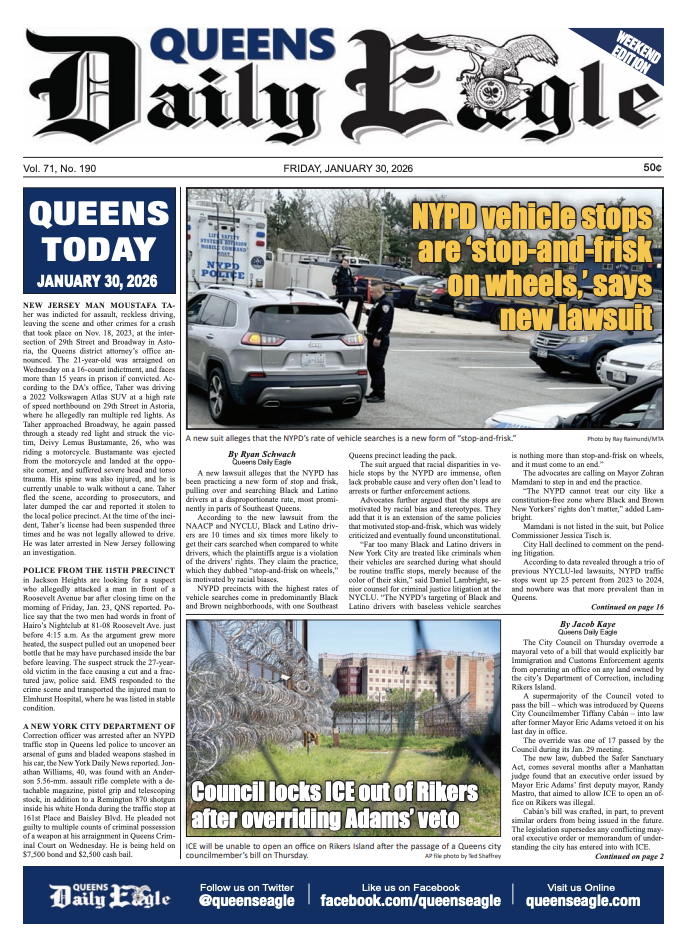Council hearing shows lapses in NYPD sexual assault investigations
/Rape victims criticized NYPD detectives during an emotionally-charged four-hour long City Council oversight hearing Monday. Screenshot via livestream
By Rachel Vick
Women, victims of sexual assault and advocates testified during a City Council hearing on bills intended to improve the transparency, efficiency and attitude within the NYPD’s Special Victims Division.
One of the people giving testimony, who identified herself only as Christine, said that detectives assigned to her case “failed to do the minimum.” Hair samples went untested, security footage from the night of her assault was never retrieved and other leads she suggested were left uninvestigated — she was, however, asked to call her rapist in an attempt to get a taped confession.
She gave as much of an overview of her multi-year ordeal to try and bring charges against her rapist as possible in the short testimony window, explaining a lack of communication and respect from officers, a lack of proactive investigation and a lack of results.
“To see the values ‘courtesy, professionalism and respect’ on every police car is an insult to my experience,” she said.
Bills introduced by Councilmembers Deborah Rose and Helen Rosenthal would attempt to improve the process by requiring the NYPD to keep track of the disposition of sex offense cases. If passed, they would also require the Mayor's Office of Criminal Justice to report on the outcomes of cases, and mandate domestic violence, sexual crimes, and human trafficking training for officers.
The legislation would expand on a 2018 law mandating officers in the Special Victims Division be trained on interviewing people with trauma.
However, the training was put on hold at the beginning of the pandemic, not continued remotely and the vendor who previously provided the training had their contract terminated.
There are currently over 100 officers in the division who have not received the mandated training, but a new vendor will restart courses next month.
Queens Councilmember Adrienne Adams, who chairs the Public Safety Committee said the NYPD’s apparent inability to continue when everyone else pivoted “raises a red flag” and described Christine having to testify in order to get the agency to investigate as “distressing.”
“We have a list here of problematic behavior, problematic interactions, problematic relationships between this division and the survivors,” Adams said. “She was in essence her own detective.”
“How in heaven's name can we allow a survivor to pick up her own case, track her own case, offer her own evidence... and then this division comes back and pretty muche slaps her in the face [and] victimizes her even more,” she added. “Why is this acceptable?”
Some testimony brought others on the call to tears and significantly impacted many of the councilmembers in attendance. Screenshot via livestream
Testimony included women detailing how their cases were not properly investigated, and the ways interaction with the division forced them to unnecessarily relive trauma both through mistreatment by officers and procedural norms like the controlled calls.
The calls are used to bolster evidence of force in situations where there are no apparent witnesses, often if the two parties know each other, said NYPD Deputy Inspector Michael King, head of the SVD. DNA evidence alone is not enough to move a case forward.
“Trying to get our information for probable cause, a lot of cases come down to we have a complainant, we have a person of interest with different explanations of what happened,” King said. “In a closed room… we have party A saying something happened and party B disputing that… hoping party B makes a disclosure [like], ‘Yes, force was used, I heard you say no.’”
One woman explained that after reporting her rape and providing the bloodied clothes she was wearing the night of her attack, she walked away when asked to call her rapist, who had already been repeatedly calling her. Meghan heard nothing for two months, during which she battled depression and emotional distress while under the impression there was no news.
In the days between learning she was pregnant and her scheduled abortion, the officer assigned to her case informed her they had been able to pull a DNA sample — she had no knowledge of the tests being performed, and could not bear to delay the abortion any longer. Doing a reverse search using the rapist's phone number, she was able to find his Facebook page in a matter of minutes.
“I never had a say in the decision to prosecute my own rapist, it was decided by SVU detectives without me,“ she said, tearfully. “It was decided when the only option for justice in my case was to contact my own rapist. It was decided when SVU neglected to contact me for months. All NYPD had to do was keep me informed.”
“If they couldn't call me once in two months, how do they treat victims that are people of color… what kind of investigation is it when the victim is asked to do the investigating,” Meghan, who is white, said.
Her testimony left many visible in the gallery view of the virtual hearing in tears, according to Rosenthal. Though the circumstances were extreme, her experiences were echoed by others like Leslie McFadden, who said her detective questioned the legitimacy of her claims and was later promoted.
“It's time the NYPD be made to care,” she said. “We need top down changes in how the NYPD investigates sexual assault cases. We need better trained detectives who will treat traumatized victims with compassion and conduct thorough investigations every single time. It's not too much to ask.”
King said since he took over, he said there have been 12 officers transferred out of the division, that he has pushed for a more rigorous review of civilian’s complaints about officers and created a checklist for investigators to maximize efficiency.
He added that while he was not leading the unit at the time, he would look into a number of the closed cases, including Christine’s.





